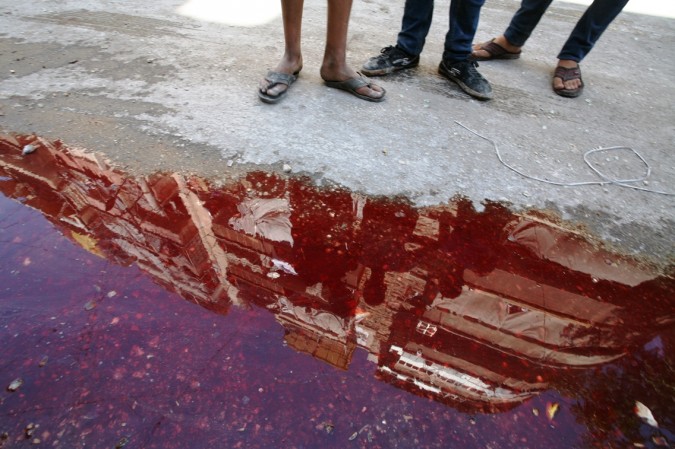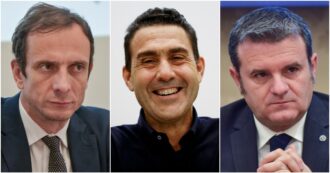The snow has a pink hue, in Aleppo. It’s snow and blood.
You walk slowly, carefully. Step by step. But it isn’t for fear of slipping. What will hide beneath? A sharp iron bar, a metal sheet that could cut you? A corpse?
Or perhaps an unexploded shell.
The snow shimmers in Aleppo. It’s snow and glass splinters.
In Syria the 7th of January was the first day, in four years, without victims. Not without dead, yet: six were found frozen – also among those who are supposed to be safe: like Majed Badawi, 6, refugee in Lebanon. They have sawed all the trees now, in Aleppo. Set fire to the roots, the doors, the school desks, the trash. Old tires. Old shoes. Nothing is left.
“But the cold stuns. You don’t realize you are going to die,” a man says. Because everybody, here, has his own preference. The best, unanimously elected, is the missile. You don’t even hear it approaching, it’s a sudden blow. It turns you to ashes, and stop – it’s over. The jet instead, it has this noise, unmistakable. This whistle. That come closer, and grows, grows, it seems rolling over you: sweeping you away: the jet flies over you, the first time, just a reconnaissance mission, and then he disappears, and then he returns, ten, twenty minutes later, and again it disappears, again it returns: with this noise, sometimes it’s close, sometimes it’s far: this anguish – but at least, you cannot see it. And until you hear it, it is actually far. Until you hear it, you hope it is going to strike somewhere else. The nigthmare is barrel bombs. This helicopter that stays over your head, like a vulture, and it’s right over you head, you can see it, it’s there and hovers, breathes over you, for minutes, and minutes, endless minutes, and it makes no sense to run, make no sense anything, because there are no basements, here, neither walls nor nothing, only rubble, it’s no longer a matter of destroying, in Aleppo, it’s a matter of crumbling, of grinding – and at any rate: should you survive, nobody would come to dig you away. Because if somebody ventures to your rescue, that’s when the second barrel hits.
Death, on the other hand, is the only topic Syrians can still express preferences about. In the past, they talked of the rebels and the regime. Of the jihadists. Of the UN and the United States. But Aleppo, today, is simply no man’s land. When we say “rebels”, according to the latest estimates we say more than 2,000 armed groups. And they change name, flag, alliance, every three days – before moving, you check the roads, now, who is there, who isn’t, as you check the time. Even Jabhat al-Nusra decided to leave. It established its emirate in Idlib. In Aleppo it exerts a sort of supervising authority, of veto power, it steps in in case of disputes: but nothing more. Too demanding to govern such a big city. Such a ruined city. To restore law and order, and most of all, the electricity grid, the water pipes. The hospitals. To provide fuel, flour. Some basic aid to the population. And they left. Because that’s how Syria is. It can be Homs, or Qusayr, Aleppo. Or Kobani. Battles always start as decisive battles whose outcome will be the outcome of the whole war. “Aleppo is crucial, once taken it over Assad will fall,” fighters explained you, before downgrading it to a strategic battle, “Aleppo is important, once taken it over Assad will be isolated,” and then, further, to a symbolic battle: “Aleppo is Aleppo, we cannot leave it to Assad” – you are told now that they realized that Aleppo or not, it makes no difference anymore. Battles in Syria always start as decisive battles: and are finally downgraded and nothing else: when they draw no attention anymore, and turn into battles with no adjectives. With no sense and no aim.
Beyond the border, more than 4 million Syrians wait to get back home. The 14th of April Nemer Khaled al-Dous, a refugee in Lebanon, too, was found hanging from a tree.
He was 6, too.
Articolo Precedente
Yumurtalik– a photo

Articolo Successivo
Elezioni Grecia: la diretta Twitter da Atene #FattoInGrecia







